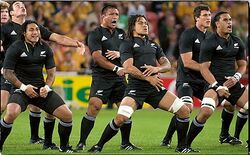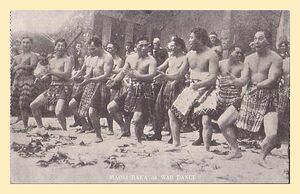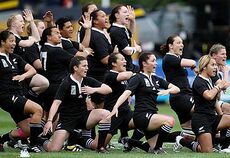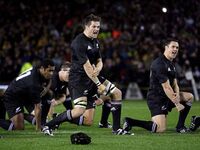Haka
The Haka is the unofficial national anthem of New Zealand and is performed at rugby matches, basketball, ice hockey, weddings and funerals.
There are many versions of the haka, but all look like a coordinated fit of epilepsy to anyone who isn't a Maori or lives outside New Zealand, Samoa, Tonga, or Fiji. Each country has its own version and their own name to the dance of men and women squatting in a formation and sticking their tongues out and jerking their arms and legs at the same time.
Origins
New Zealand may now seem peaceful, but the British colonisers in the early 19th century fought a series of wars against the native Maori peoples. The British were impressed by the Maori chanting and gesturing as they performed the haka — before loosening off a volley to reduce their opponents to dog meat. The more the Maori did the haka, the more the British thought it was their job to bring civilisation and afternoon tea there.
Soon, the settlers started to develop their own 'Kiwi' nationalism. They wanted to be different from the British — and not be mistaken for Australians either. New Zealand adopted the game of rugby, a sport for big beefy men, hoping to distract the farmers from playing with the sheep. All they needed was their own 'song'. Then they remembered the Maori war dance.
In 1905, a team of New Zealand rugby players toured Britain. Angry at being mistaken for Australians again, the team chose their own anthem. Dressed in black (as it made them look less grotesque in their strips), the team startled a Welsh side by performing a Haka known as the Ka Mate (We Ain't Bloody Aussies, Mate).
| Leader: | Ringa pakia! | Slap your hands against your bum! |
| Uma tiraha! | Puff out the chest until your nipples stand erect. | |
| Turi whatia! | Bend your knees, let out a fart! | |
| Hope whai ake! | Swing your hip like a pole dancer! | |
| Waewae takahia kia kino! | Stomp the feet as if you're killing bugs. | |
| Leader: | Ka mate, ka mate | I'll diet, I'll diet, |
| Team: | Ka ora' Ka ora' | Orange juice, Orange juice. |
| Leader: | Ka mate, ka mate | I'll diet, I'll diet |
| Team: | Ka ora Ka ora " | Orange juice, Orange juice. |
| All: | Tēnei te tangata pūhuruhuru | This is a hairy man who needs a hairy woman. |
| Nāna i tiki mai whakawhiti te rā | Who wants to visit the place the sun don't shine. | |
| A Upane! Ka Upane! | My bladder's bursting, My bladder's bursting. | |
| Upane Kaupane" | Out it comes | |
| Whiti te rā,! | Let the golden rain fall. | |
| Hī! | Now wash your hands. |
Haka in action
The New Zealand rugby team perform the haka at every international game and tournament. New Zealanders are now so used to this chant/dance number that it has even featured in the Auckland Techno-Sporting Tunes chart for the last 20 years. Not to perform the haka is said to bring on bad luck.
Teams that don't start a match with an inspiring dance complain about how much time a haka takes up. When both countries have a haka, it takes twice as long. However, sports federations refuse to ban the dance, and suggest that other countries get their own little number. For instance, England could perform a vigorous Morris Dance on the pitch. The Welsh could sing Men of Harlech or Tom Jones' It's Not Unusual, whilst the Irish have a variety of jigs they could look into. In the end, most other countries try the 'stare down' or 'in your face' approach when facing a New Zealand side.
The haka is just for a rugby field (whether Rugby Union or Rugby League). New Zealand sporting teams, both men and women, perform the haka if allowed to. It has become part of New Zealand culture as much as Hobbits and suicide. However, efforts to introduce it at football matches failed, over fears that it would incite even more violence amongst football fans than normal.
Sir Edmund Hillary, the first man to climb Mount Everest, performed the Haka 29,000 feet up to prevent Tenzing Norgay (Sherpa Tenzing) from getting ahead of him. However, Hillary forgot to pack a New Zealand flag and had to make do with the Union Jack instead (which is why the British claimed 'they' had climbed the mountain instead).
Haka losing its power?
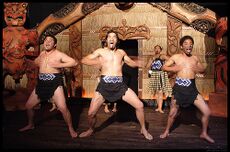
Some New Zealanders say the haka has lost its power to scare people and should be retired. They say the haka is too aggressive and should be about loving and caring for one's fellow man and all the cuddly animals.
However, others identify the haka as the essence of Kiwiness that justifies living out in the middle of nowhere. They say it is vital for tourism, and that sports that have not adopted it could find a way to work one in during the singing of the national anthem without seeming disrespectful. In fact, tourists who spend a fortnight in New Zealand without ever seeing a haka should complain and ask for their money back.
See also
| Featured version: 21 February 2023 | |
| This article has been featured on the main page. — You can vote for or nominate your favourite articles at Uncyclopedia:VFH. | |
